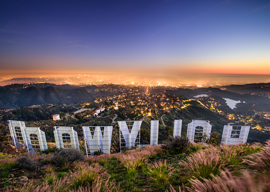
January 26, 2017

Los Angeles, CA
Source: Bigstock
My problem with Hollywood’s leftism isn”t that it’s “destroying the country,” but rather that it’s destroying the very notion of good entertainment. Hollywood’s not hurting us as much as it’s hurting itself. I thought about that just a few days ago as I watched the most recent episode of Saturday Night Live, in which two cast members sang a deadly-serious farewell song to President Obama. Where was the humor? Shit, where was the attempt at humor? My problem with SNL these days isn”t that the jokes aren”t funny, but that there aren”t any jokes anymore. After the election, when Lorne Michaels allowed Kate McKinnon to open the show with a completely and purposely humorless elegy to Hillary Clinton, one that ended with a straight-out statement of political advocacy, he pissed on his own legacy in a way that astonished me. Almost every previous “dramatic” cold open, from the show’s first post-9/11 episode, to Steve Martin’s tearful farewell to Gilda Radner in 1989, at least tried to shoehorn a joke in at the end. But with McKinnon, there wasn”t even an attempt. Michaels was basically saying that Clinton’s loss was worse (more serious, less deserving of humor) than 9/11. That’s appalling.
But Michaels” destruction of the show he supposedly holds so dear isn”t a threat to America, and if he keeps it up, it won”t be a threat to Trump’s reelection in 2020 or the GOP’s chances in the midterms. The only victim here is a late-night television institution. Just remember”if SNL had the power to elect presidents, H.W. Bush would have easily coasted to reelection in “92 because of sketches like this.
Granted, Dan McLaughlin at RedState claims that Trump’s victory is a validation of Breitbart’s “downstream from culture” theory, but I find his argument most unconvincing. Yes, Trump had high visibility via his participation on reality shows, but that’s not what Andrew was talking about. Everyone knows that visibility is a good thing for a candidate (although apparently Hillary Clinton didn”t know that, or else she wouldn”t have gone AWOL from the campaign trail at the worst possible time). Breitbart wasn”t talking about visibility; he was talking about narratives, how Hollywood creates stories that subliminally influence politics. His premise concerned the subtle weaving of themes in popular entertainment, and how this can (supposedly) influence election results. This is the concept that conservatives need to reexamine.
If conservatives can free themselves from the burden of thinking they have to compete with Hollywood or “become their own Hollywood,” they”ll be a lot happier. Because frankly (and I made this point in a column a few years ago), at Friends of Abe, we weren”t particularly good at that “FYBU” stuff. The projects we cranked out”be it movies, TV pilots, or political commercials”were absolutely atrocious. Don”t get me wrong”we had some phenomenally talented people on the team, and, individually, those folks had the ability to turn out great stuff. Friend of Abe Joel Surnow, for example, had a huge hit with 24, a show that did indeed manage to weave pro-war-on-terror messages into a compelling story line. Some on the left have accused Surnow of “influencing the public” regarding acceptance of torture as a legitimate weapon in the fight against Islamic terror. Conversely, some on the right (and left) have attacked (and praised) Surnow for prepping the ground for Obama via his sympathetic, heroic portrayal of a black president.
They”re all wrong. 24 was just a very entertaining show with a decent high-concept gimmick. I”d suggest that in 2008, no Republican, not even zombie Reagan, could have won, with the economy in free fall, the Iraq War a disaster, and Bush and the GOP blamed for it all. Sure, Hollywood was behind Obama 100% in 2008, just as it was against Bush 100% in 2004. Hollywood didn”t matter in that election, and it didn”t matter in 2016, either. In fact, it may never have mattered, so, with apologies to Breitbart, I think he spent a little too much of his tragically brief life acting as though it did.
By overestimating the importance of the entertainment industry in the political process, all we end up doing is inflating the egos of a bunch of worthless buffoons who already have way more unearned self-esteem than they need.